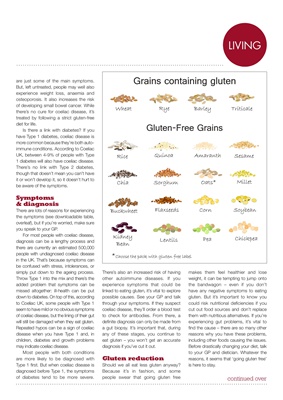
KITLIVING
continued over
are just some of the main symptoms.
But, left untreated, people may well also
experience weight loss, anaemia and
osteoporosis. It also increases the risk
of developing small bowel cancer. While
there's no cure for coeliac disease, it's
treated by following a strict gluten-free
diet for life.
Is there a link with diabetes? If you
have Type 1 diabetes, coeliac disease is
more common because they're both autoimmune conditions. According
to Coeliac
UK, between 4-9% of people with Type
1 diabetes will also have coeliac disease.
There's no link with Type 2 diabetes,
though that doesn't mean you can't have
it or won't develop it, so it doesn't hurt to
be aware of the symptoms.
Symptoms
& diagnosis
There are lots of reasons for experiencing
the symptoms (see downloadable table,
overleaf), but if you're worried, make sure
you speak to your GP.
For most people with coeliac disease,
diagnosis can be a lengthy process and
there are currently an estimated 500,000
people with undiagnosed coeliac disease
in the UK. That's because symptoms can
be confused with stress, intolerances, or
simply put down to the ageing process.
Throw Type 1 into the mix and there's the
added problem that symptoms can be
missed altogether: ill-health can be put
down to diabetes. On top of this, according
to Coeliac UK, some people with Type 1
seem to have mild or no obvious symptoms
of coeliac disease, but the lining of their gut
will still be damaged when they eat gluten.
Repeated hypos can be a sign of coeliac
disease when you have Type 1 and, in
children, diabetes and growth problems
may indicate coeliac disease.
Most people with both conditions
are more likely to be diagnosed with
Type 1 first. But when coeliac disease is
diagnosed before Type 1, the symptoms
of diabetes tend to be more severe.
There's also an increased risk of having
other autoimmune diseases. If you
experience symptoms that could be
linked to eating gluten, it's vital to explore
possible causes. See your GP and talk
through your symptoms. If they suspect
coeliac disease, they'll order a blood test
to check for antibodies. From there, a
definite diagnosis can only be made from
a gut biopsy. It's important that, during
any of these stages, you continue to
eat gluten - you won't get an accurate
diagnosis if you've cut it out.
Gluten reduction
Should we all eat less gluten anyway?
Because it's in fashion, and some
people swear that going gluten free
makes them feel healthier and lose
weight, it can be tempting to jump onto
the bandwagon - even if you don't
have any negative symptoms to eating
gluten. But it's important to know you
could risk nutritional deficiencies if you
cut out food sources and don't replace
them with nutritious alternatives. If you're
experiencing gut problems, it's vital to
find the cause - there are so many other
reasons why you have these problems,
including other foods causing the issues.
Before drastically changing your diet, talk
to your GP and dietician. Whatever the
reasons, it seems that 'going gluten free'
is here to stay.